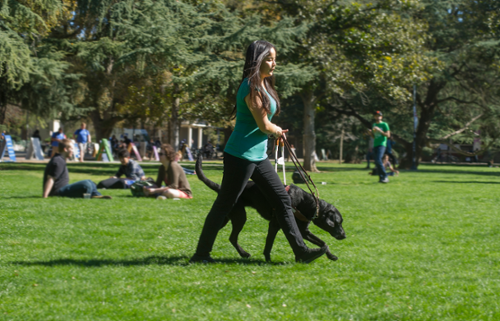 University of California, Davis recognizes the importance Service and Assistance Animals have for individuals with disabilities. The University is committed to providing equal access to its classrooms, research facilities, public spaces and housing for all of its community members, including students, employees and visitors.
University of California, Davis recognizes the importance Service and Assistance Animals have for individuals with disabilities. The University is committed to providing equal access to its classrooms, research facilities, public spaces and housing for all of its community members, including students, employees and visitors.
For Students and Visitors
Permitted animals: For students and visitors, only Service Animals are permitted in areas where dogs are not otherwise allowed. A Service Animal is a dog that is individually trained to do work or perform tasks for an individual with a disability.
Animals NOT permitted: The following are NOT Service Animals: 1) non-dog animals, except in some cases miniature horses; 2) animals that solely serve to deter crime; 3) emotional support, comfort, and companion animals.
For Employees
Permitted animals: Employees and applicants for employment may have Service Animals and Assistive Animals as a reasonable accommodation, including trained Service Animals and emotional support animals.
Permitted inquiries: The University may require documentation explaining why the employee requires an Assistive Animal in the workplace. ALL such inquiries must be handled through Disability Management Services, as they may involve confidential medical information.
If you are not sure a dog is a Service Animal
Permitted Inquiries: If it’s not readily apparent that an animal is trained to do work/perform tasks, then University employees can ask two questions ONLY:
1) Is the animal required because of a disability; and
2) What work/task is the animal trained to perform?
If the answer to the first question is yes and the answer to the second question is some work or task related to the disability, then the animal is a Service Animal.
Prohibited Inquiries: University employees may NOT ask about the nature/extent of the disability, may NOT require documentation that the dog is trained or is a service animal, and may NOT ask the dog to perform the work/task.
For University Housing
Permitted animals: In University housing, both Service Animals and Assistance Animals are permitted. An Assistance animal is any animal, including non-dog animals, that 1) works, 2) provides assistance, 3) performs tasks, 4) or provides emotional support that alleviates an identified symptom/ effect of a person’s disability.
Permitted Inquiries: Requests for support animals in student housing begin at the Student Disability Center. Notification of a Service Animal should be provided to Student Housing and Dining Services https://housing.ucdavis.edu/accessible-housing/.
Requirements for all Service and Assistance Animals
- The handler, not the University, is responsible for the animal’s care and supervision.
- The handler must keep the animal under control in public areas – via a harness, leash, tether, or voice control, depending on the task/work performed.
- The animal must be free from offensive odors and display habits appropriate to the environment. For example, the animal must be house-broken.
- The animal may not engage in behavior that endangers the health or safety of others.
- The animal must comply with Yolo County codes, including requirements for vaccinations and licensing laws. Documentation may be required.
Removal of Service or Assistance Animals
A University employee may ask for an animal to be removed if: (1) the inquiry indicates that the animal is not a permitted Service or Assistance Animal; or (2) the handler does not comply with the requirements (above) for all Service and Assistance Animals.
If someone is allergic or afraid
If an individual reports a medical condition(s) that is affected by a Service or Assistance Animal, (respiratory disease, asthma, and severe allergies) the University will consider the needs of all parties in meeting its obligation to provide reasonable accommodations.
Generally, allergies and fear of dogs may not be valid reasons for denying access to handlers with Service or Assistance Animals, without attempting to accommodate the parties through a separation or other arrangements. An individualized assessment is required for each situation.
Laboratories, Animal Facilities, and Research Areas
There may be areas where a Service or Assistive Animal poses a substantial and direct threat to health and safety that cannot be reduced or eliminated by a reasonable accommodation. These areas may include laboratories, animal research areas, medical facilities and food preparation areas. An individualized assessment is required before the Service or Assistive Animal is denied entry. An individualized assessment may include the nature, duration and severity of the risk, the probability of harm or injury, and the availability of modifications to minimize the risk. Departments may require reasonable safety precautions such as booties and/or a lab coats for Service or Assistive Animals in such areas.
Concerns about a Service or Assistance Animal
If there is a problem with a Service or Assistance Animal that cannot be resolved through applying these guidelines, the following resources may be helpful:
Policy
UC Davis Policy on Support and Service Animals
General Issues
ADA Compliance Office: (530) 752-6550; compliance@ucdavis.edu
Employee Issues
Disability Management Services: (530) 752-6008; reasonableaccommodationrequest@ucdavis.edu
Housing Issues
Student Housing Office: (530) 752-2033; studenthousing@ucdavis.edu
Student Academic Accommodation Issues
Student Disability Center: (530) 752-3184; jabilleci@ucdavis.edu
Animal Control
Environmental Health and Safety: (530) 752-1493
Emergencies
UC Davis Police: (530) 752-1230